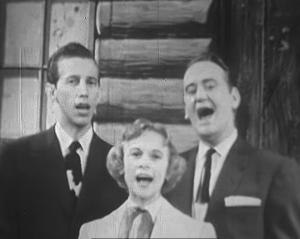Ozark Jubilee Digitization Project is Complete

After years of fundraising and good, hard work, the Ozark Jubilee Digitization Project is now complete. All of the kinescopes held by the UCLA Film and Television Archive have been digitized, transcribed, enriched with metadata, and put online for everyone to enjoy and study free of charge. These recordings of the most important musical production to ever come out of the Ozarks now have been preserved.
The Ozark Jubilee, which ran weekly from December 1953 until September 1960, first as a local television broadcast over KYTV, then as a stage and radio program (locally on KWTO and over the ABC Radio Network), and from January 1955 until the end as an ABC-TV national television broadcast, was produced and presented in 30-minute segments. The length of the show varied from 30 to 90 minutes over its long history. Most of the Ozark Jubilee broadcasts originated from the Jewell Theater on South Jefferson Avenue, where Jubilee Park is today.
The project began years ago when Wayne Glenn, the Old Record Collector, made an appointment to meet with Tom Peters, Dean of Libraries at MSU, to tell him that he had found a large collection of approximately 65 kinescopes at the UCLA Film and Television Archive in Los Angeles. After some negotiations, the Archive agreed to digitize their kinescopes, send copies of the digitized files to the MSU Libraries, and allow the MSU Libraries to make them freely available online to the general public.
Funding for this massive, multi-year digitization project came from a variety sources. Every gift, large and small, provided precious financial support for this project. The three major sources of financial support were:
- A major gift from the Martin Family Foundation, which provided sufficient funding to finally complete this project.
- A grant from the Grammy Museum Foundation.
- “Carryforward Funds” from the annual operating budget of the MSU Libraries. Sources of carryforward funds from one fiscal year to the next are varied, but often the “lapsed dollars” from unfilled positions due to retirements and departures from employees accrue between the time an employee leaves and the Libraries is able to reallocate that salary money to a new hire.
Only one of the kinescopes held by the UCLA Film and Television Archive had deteriorated to such an extend that it could not be saved. We also have been able to digitize several other 30-minute segments of the Jubilee held by other individuals and organizations. We’re always interested in learning about kinescopes that are out there.
Once the massive files were received from the UCLA Film and Television Archive, employees of the MSU Libraries, primarily Nathan Neuschwander and Craig Amason, worked to clean up the files, sometimes enhancing the sound and video quality, adding closed captioning and other types of metadata, including the extremely useful navigable lists of the various performances — music, dance, comedy, and commercials — from each 30-minute segment.
As the Omicron surge continues to wane in Southwest Missouri, plans for some type of reception to celebrate the completion of the Ozark Jubilee Digitization Project are underway and will be announced soon. The celebration reception, which will be held in the new Ozarks Room on the Third Level of Duane G. Meyer Library, will contain elements of a hillbilly variety show, to honor the Ozark Jubilee.